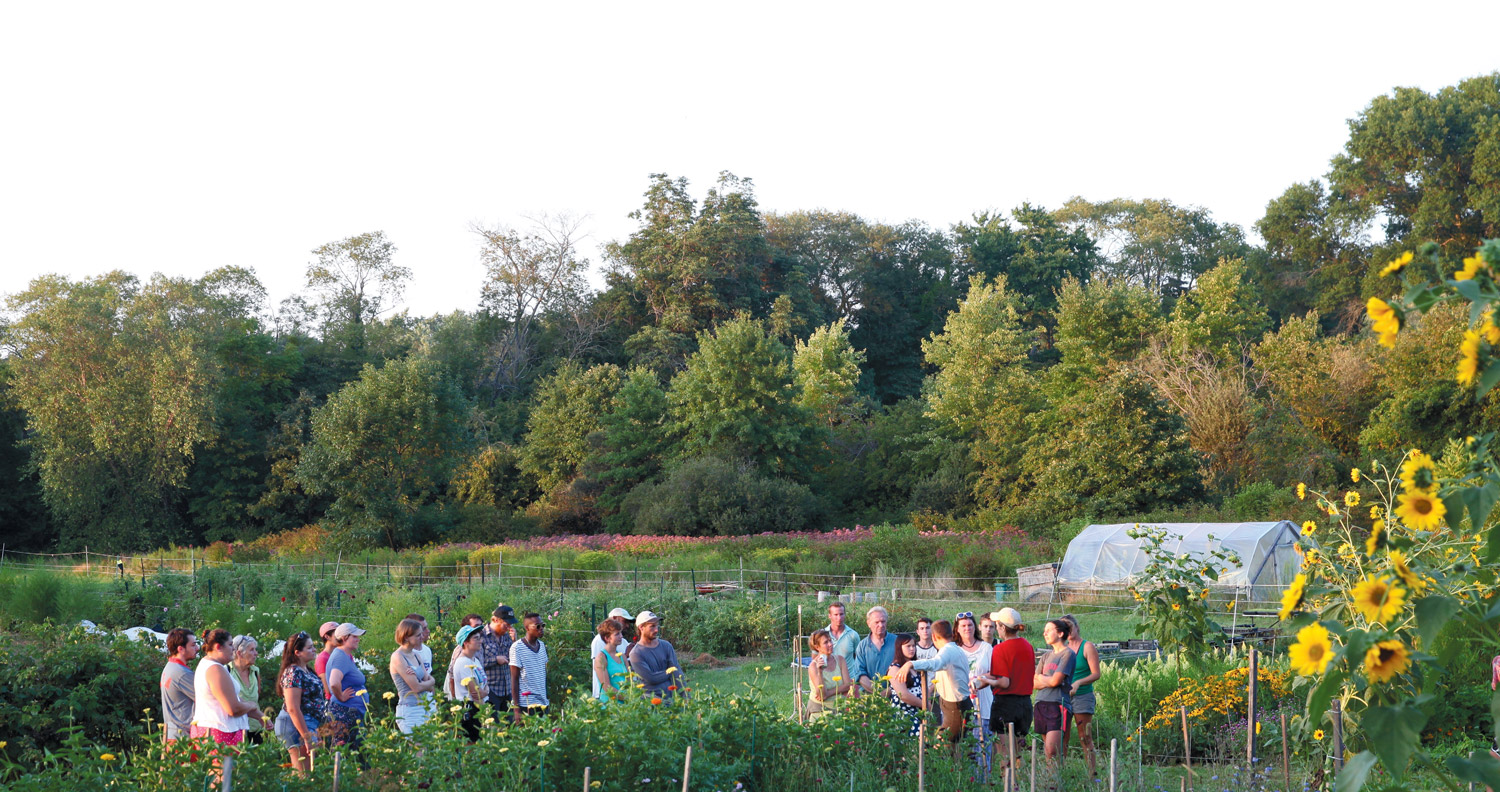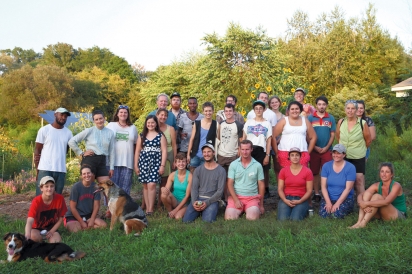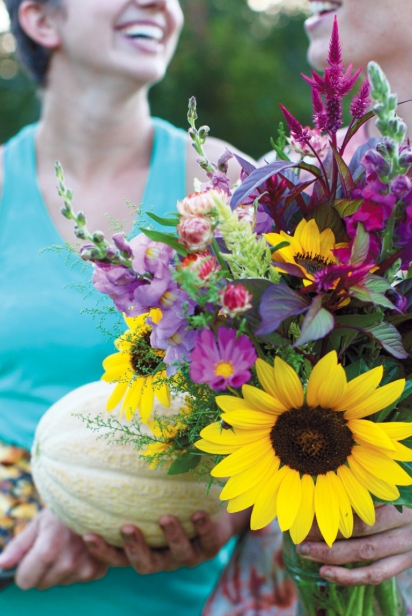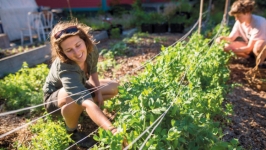The Young Farmer Network
The Future of Farming and Why an Evening Potluck Is More Than Just a Meal
The late summer sun dips slowly over Sidewalk Ends Farm in Seekonk, Massachusetts, setting aglow fields of towering sunflowers and hearty greens. A group of young farmers gathers for a tour of the farm with Tess Brown-Lavoie, Sarah Turkus and Laura Brown-Lavoie, discussing topics ranging from irrigation techniques to favorite cover crops. The group assembled represents farms from across the region, including Scratch Farm, Eva’s Garden, Hocus Pocus Farm, Rosasharn Farm, Southside Community Land Trust (SCLT), Deep Roots Farm, Freedom Food Farm, Big Train Farm and Langwater Farm, to name just a few.
They are gathered here as part of the Young Farmer Network (YFN) of Southeastern New England, which encompasses Massachusetts, Rhode Island and Connecticut. The farmers in attendance identify as “young farmers,” though as Turkus, who serves as YFN’s organizer, is quick to point out, age is not the only qualifier.
“The young farming community ranges from late 20s to mid 40s, and they work on farms, own farms or are looking to own,” she explains. “We also have second-career farmers and additional-career farmers. We don’t put limitations on age. As long as you understand there is more to learn, you are welcome here.”
As the average age of farmers across the country rises with each passing year—the last data gathered from the 2017 U.S. Department of Agriculture’s Census of Agriculture found the average age of farmers is now 59.4-years-old—YFN is working to build a strong community of young farmers. Founded as a chapter of the National Young Farmers Coalition in 2010 by Margiana Petersen-Rockney as a way to support young farmers, YFN builds connections within the farming community and provides its members with educational opportunities.
Every other week from May through October, a different farm hosts Young Farmer Night, which includes the above-mentioned tour, as well as a potluck. “We set a time and space to bring farmers together in a low-pressure environment, potluck style,” says Turkus. “Time goes by so fast in the busy season of farming, and it’s nice to know that twice a month you will get a chance to connect and socialize.”
In addition, many important collaborations come out of these evenings: sharing of equipment, ordering of bulk supplies and sharing of job opportunities. “It’s always interesting to see how other farmers are making it work, to see the techniques and equipment they use, but it is also great for the camaraderie,” says YFN member Elizabeth Leibovitz, medicinal gardener at University of Rhode Island’s (URI) College of Pharmacy. “Otherwise, people put their best faces forward,” adds Erika Rumbley, greenhouse manager at the Isabella Stewart Gardner Museum, “so it is nice to gather and talk about the reality of farming.”
In the winter months, YFN offers a variety of short courses on subjects such as soil science, insect identification, small engine mechanics, farm accounting and irrigation design. These courses are cultivated in response to the members’ needs, and cover any and all subjects related to running a successful farm business.
“The short courses are designed to empower young farmers to expand their skills,” explains Turkus. Courses, which can run for a full day or a series of weeks, are taught in collaboration with organizations such as the URI Cooperative Extension, SCLT, Northeast Organic Farming Association of Rhode Island and others.
Equally important as their community work and educational programming is YFN’s involvement in land access work. As part of the Land Access Working Group convened by SCLT that includes nonprofits, other land trusts and the Rhode Island Department of Environmental Management’s Division of Agriculture, work is being done to connect farmers in need of land to those who have land, and to identify farmland that is protected by the state but not being actively farmed.
It’s heartening that farmers and landowners are being creative around land access issues, some private landowners are willing to lease part of their land to farmers, and suburban land is being reclaimed as farmland. But, there are real challenges to this work.
“We’re essentially asking older farmers to face their mortality by giving up their farm when they can’t physically farm anymore,” says Turkus. “Farmland is at risk of being lost forever when current farmers age out of actively farming and they don’t have family that want to take over. It is a scary thing, and so we are trying to introduce them to young farmers and begin those difficult conversations before it is too late.”
There are positive signs that work is paying off, though there are still many challenges ahead in solving the issues around affordable farmland for future farmers.
To study complex issues of land history, food justice, lineages of stewardship and ongoing histories of colonization and slavery, YFN organized the Justice & Agriculture Working Group, which meets monthly. As stated in its mission, “We activate the land, food, and members of the local farming community to support antiracist work led by indigenous people and people of color.”
Last year one of the group’s action items was aggregating food donations for the Intertribal Food Sovereignty Summit. Additionally they assisted the Tomaquag Indian Memorial Museum in growing a garden of culturally and historically relevant crops. The group also hosts speakers, such as Leah Penniman, author of Farming While Black: Soul Fire Farm’s Practical Guide to Liberation on the Land, a 2019 James Beard Award winner who recently conducted an all-day training in Rhode Island.
“We feel that one important early step on a journey towards food justice and racial justice is to study and learn from the past,” says Turkus, “and bring to light the erased or minimized histories of farming in the Northeast.” That includes studying the precolonial and colonial era histories of this region and telling the stories of the farmland they work on today.
The work is in keeping with the overarching YFN mission: to strive to create an environment within which people of all ages and agricultural backgrounds can cultivate personal and professional relationships across state borders. The YFN mission statement includes a second set of goals: to work towards a supportive landscape for farmers and prospective farmers in developing socially, ecologically and economically sustainable farm businesses, and fulfilling lives.
Through its work, YFN provides an important foundation for young or newer farmers to learn from one another, to use that knowledge to improve the odds and to grow our local farming community towards a more solid and equitable future.
For more information, visit YoungFarmerNetwork.org.








